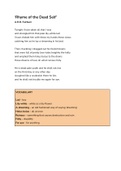Summary
Summary 'Rhyme of the Dead Self' by A R D Fairburne - Poem Analysis
Here's a complete breakdown of the poem 'Rhyme of the Dead Self' by A R D Fairburne; from the CAIE / Cambridge IGCSE and O Level Poetry Anthology (Songs of Ourselves, Volume 2, Part 4). Includes, but is not limited to: VOCABULARY STORY / SUMMARY SPEAKER / VOICE ATTITUDES LANGUAGE FEATUR...
[Show more]




